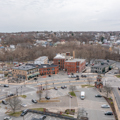This square fits into one of the W-bends of the Blackstone, where the towered and mansarded Globe Mills directly across the river once provided a looming backdrop. Main Street enters at one corner, echoing the curve of the river's bend around two sides (and becoming South Main Street as it does so). Following this bend, and on alleylike spurs from it (notably on nearby Allen Street), is a huddle of old mill buildings (many altered) which were once substantially occupied by Edward Harris's woolen enterprise. Where there is now parking, an open-air market once existed at the center of mill activity, making it an area of intense but colorful congestion. At 1 Main Street (intersection of Main and Bernon streets) is the Lippitt (later Hanora) Mill office and warehouse (1836), a fine, mansarded factory building in which the wall is virtually reduced to sheer brick piers crossed by continuous banding of rough granite into which expansive windows are fitted. Attached to it is the older Ballou-Harris-Lippitt rubble masonry mill (1827), centered by a low, clapboarded loading tower with a Greek Revival pediment. Built by George Ballou, it passed to successive owners who provide a roster of Woonsocket's most prominent woolen manufacturers. Fronting the complex is a piece of the granite-lined Lyman-Arnold Power Trench (c. 1827), which once served a number of mills in the vicinity. The image of the mansarded corner building, which Henry-Russell Hitchcock illustrated in his Rhode Island Architecture (1939), has inevitably lost some of its force through its
You are here
Market Square
1820s and later. Junction of Main, Bernon, Arnold, and River sts.
If SAH Archipedia has been useful to you, please consider supporting it.
SAH Archipedia tells the story of the United States through its buildings, landscapes, and cities. This freely available resource empowers the public with authoritative knowledge that deepens their understanding and appreciation of the built environment. But the Society of Architectural Historians, which created SAH Archipedia with University of Virginia Press, needs your support to maintain the high-caliber research, writing, photography, cartography, editing, design, and programming that make SAH Archipedia a trusted online resource available to all who value the history of place, heritage tourism, and learning.






